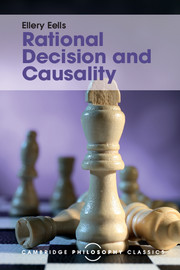Book contents
- Frontmatter
- Dedication
- Contents
- Preface to this edition
- Preface
- Introduction
- 1 Bayesianism
- 2 The philosophical and psychological significance of Bayesian
- 3 Bayesian decision theories: some details
- 4 The counterexamples
- 5 Causal decision theories
- 6 Common causes, reasons and symptomatic acts
- 7 A general defense of PMCEU
- 8 Newcomb's paradox
- Appendix 1 Logic
- Appendix 2 Probability
- Bibliography
- Index
- Frontmatter
- Dedication
- Contents
- Preface to this edition
- Preface
- Introduction
- 1 Bayesianism
- 2 The philosophical and psychological significance of Bayesian
- 3 Bayesian decision theories: some details
- 4 The counterexamples
- 5 Causal decision theories
- 6 Common causes, reasons and symptomatic acts
- 7 A general defense of PMCEU
- 8 Newcomb's paradox
- Appendix 1 Logic
- Appendix 2 Probability
- Bibliography
- Index
Summary
Bayesianism is usually characterized as the philosophical view that, for many philosophically important purposes, probability can usefully be interpreted subjectively, as an individual's “rational degree of belief,” and that the rational way to assimilate new information into one's structure of beliefs is by a process called ‘conditionalization’. The subjective interpretation of probability is connected, however, in very important ways with a mathematically precise and intuitively plausible theory of rational decision, called the ‘subjective expected utility maximization theory’. Because of this connection, and the nature of it, Bayesianism can alternatively be characterized as the view that (i) rational decision and rational preference go by subjective expected utility, (ii) subjective probabilities (and numerical subjective utilities) are more or less theoretical entities that “lie behind,” explain and are given partial empirical interpretation by, an individual's choices and preferences and (iii) learning goes by conditionalization. In this chapter and the next two, I will describe these three aspects of Bayesianism, discuss their plausibility and indicate various ways in which they are philosophically significant. The subsequent chapters will deal with a formidable challenge to this potentially very powerful philosophical theory.
Subjective expected utility
Deliberation is the process of envisaging the possible consequences of pursuing various possible courses of action and evaluating the merits of the possible courses of action in terms of their possible consequences. Roughly, the Bayesian model says that a course of action has merit to the extent that it makes good consequences probable and that a rational person pursues a course of action that makes the best consequences the most probable, where the goodnesses and probabilities of the consequences are the agent's subjective assessments thereof: how true, reasonable or otherwise objectively or morally sound these assessments are is regarded as a separate question.
This last point is quite important; it indicates an essential feature of Bayesianism and Bayesian decision theory which is worth fully noting at the outset. It is implicit in the theory that whether or not a given course of action in a given decision making situation is rational is not an absolute kind of thing: a course of action is rational only relative to a possessed body of information (beliefs and desires) in terms of which the merits of the available courses of action can be rationally evaluated.
- Type
- Chapter
- Information
- Rational Decision and Causality , pp. 3 - 21Publisher: Cambridge University PressPrint publication year: 2016

